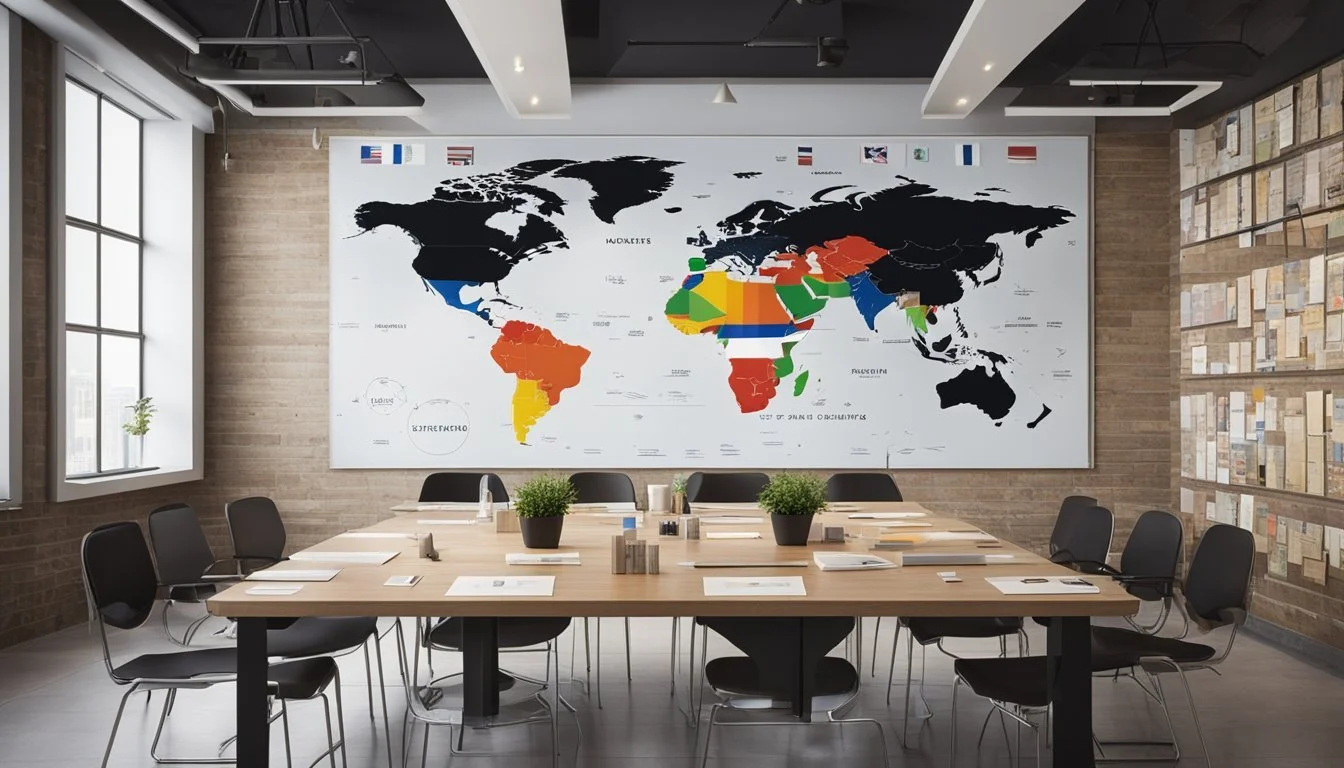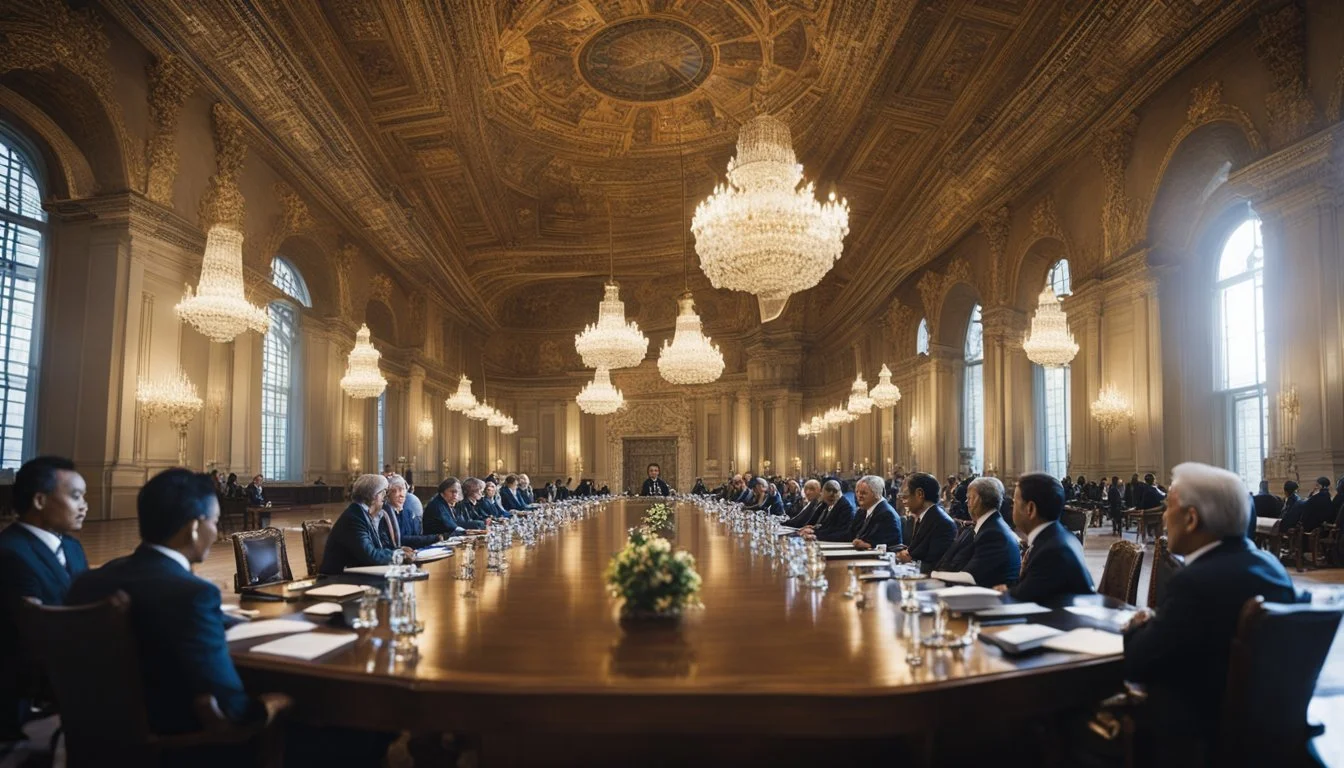10 Films on Political Negotiations
Must-Watch Dramas and Documentaries
Political negotiations have been a compelling theme in cinema, reflecting the intricate dynamics of power, strategy, and human interaction. Films on this subject often explore the delicate balance between diplomacy and conflict, providing viewers with an immersive experience into the world of politics.
Such films not only entertain but also educate audiences on the complexities of political decision-making. By portraying various scenarios—from high-stakes international diplomacy to internal government negotiations—they offer a nuanced perspective on how leaders navigate their agendas and the resulting impact on society.
1) The Ides of March (2011)
The Ides of March, directed by George Clooney, delves into the tumultuous world of political campaigns. It features Ryan Gosling as an idealistic staffer. He learns harsh realities about political negotiation and strategy.
The film is an adaptation of Beau Willimon's 2008 play "Farragut North." Its ensemble cast includes George Clooney, Philip Seymour Hoffman, Paul Giamatti, and Marisa Tomei.
The narrative reveals the cutthroat nature of political campaigns. Trust and loyalty are tested. Decisions are made that challenge personal ethics.
The plot focuses on the presidential campaign trail. It highlights the impact of scandals and the compromises made for power. This film offers a gripping portrayal of backroom deals and political maneuvers.
For more information, see The Ides of March on IMDb.
2) Lincoln (2012)
The film "Lincoln," directed by Steven Spielberg, offers a nuanced portrayal of President Abraham Lincoln's political maneuvering during the final months of the Civil War. It focuses on Lincoln's efforts to pass the Thirteenth Amendment, which aimed to abolish slavery.
Daniel Day-Lewis delivers a powerful performance as Lincoln, embodying his moral resolve and political savvy. The film portrays the intricacies of behind-the-scenes negotiations in the House of Representatives.
Key scenes depict Lincoln engaging with radical Republicans and conservative Democrats, showcasing his ability to balance different factions.
Lincoln’s negotiation tactics involved empathy, persistence, and strategic offers of political favors. The film also highlights the conflicts and alliances that shaped the amendment's passage, portraying the high-stakes environment in which Lincoln operated.
More information can be found on IMDb.
3) Thirteen Days (2000)
"Thirteen Days" offers a compelling portrayal of the Cuban Missile Crisis. The film focuses on the critical negotiations that took place behind closed doors and the intense pressure faced by President John F. Kennedy and his advisors.
The story is told from the viewpoint of Kenny O'Donnell, President Kennedy's special advisor. This perspective brings viewers closer to the strategic discussions and decision-making processes that ultimately prevented a nuclear conflict.
Kevin Costner plays Kenny O'Donnell, adding depth to the character's role as a mediator and problem-solver. The film emphasizes the delicate balance of power and the high-stakes nature of political negotiations.
The authenticity of the negotiations is enhanced by the film's detailed depiction of real events. The dialogues are sharp and convey the urgency of the situation.
"Thirteen Days" serves as an educational tool for understanding how diplomacy and communication can resolve critical international crises.
For more information, visit IMDB.
4) The Post (2017)
"The Post" is a political thriller directed by Steven Spielberg. It centers on The Washington Post's efforts to publish the Pentagon Papers, classified documents detailing U.S. political and military involvement in Vietnam.
Meryl Streep stars as Katharine Graham, the first female publisher of a major American newspaper. Tom Hanks plays Ben Bradlee, the newspaper's executive editor.
The film showcases the intense political negotiations and legal battles that ensue as The Washington Post decides whether to publish the Pentagon Papers.
The narrative underscores the importance of press freedom and the First Amendment in the face of government secrecy.
"The Post" received critical acclaim and was chosen by the National Board of Review as the best film of 2017. It was also named one of the top 10 films of the year by Time magazine and the American Film Institute.
For more information, visit The Post on IMDb.
5) Bridge of Spies (2015)
Bridge of Spies, directed by Steven Spielberg, centers on the tense Cold War period. The film portrays James B. Donovan, an American lawyer who navigates delicate negotiations between the U.S. and the Soviet Union.
Tom Hanks plays Donovan, who is tasked with defending Soviet spy Rudolph Abel, played by Mark Rylance. The story focuses on the high-stakes negotiation for Abel's exchange with captured American pilot Francis Gary Powers.
The film presents the contrasting ideologies of the two superpowers. Through careful dialogue and cinematography, it showcases the complexity and human elements of political negotiation.
More about Bridge of Spies can be found on Wikipedia.
6) Argo (2012)
Argo, directed by and starring Ben Affleck, focuses on the real-life rescue operation known as the "Canadian Caper." This mission involved the extraction of six U.S. diplomats from Tehran during the 1979-1981 Iran hostage crisis.
The film presents a high-stakes scenario where CIA operative Tony Mendez devises an elaborate plan. The diplomats are to pose as a Canadian film crew scouting locations for a science fiction movie.
The movie captures the tension and complexities of international negotiations and subterfuge. It shows the collaboration between the CIA and the Canadian government, highlighting the intricate political maneuvers required to ensure the diplomats' safety.
Argo won the Academy Award for Best Picture, underscoring its critical acclaim and impact. It’s noted for its gripping narrative and attention to detail, making it a standout film about political negotiations and international relations.
7) Zero Dark Thirty (2012)
Zero Dark Thirty, directed by Kathryn Bigelow, delves into the decade-long hunt for Osama bin Laden. This film meticulously chronicles the complex and high-stakes negotiations that led to the eventual raid on bin Laden's compound.
The plot showcases the persistent efforts of the CIA team, especially the protagonist, Maya, portrayed by Jessica Chastain. Her character is a composite based on real-life intelligence officers involved in the mission.
Viewers are given a behind-the-scenes look at the intense briefing sessions and strategic discussions that were critical to the operation's success. These scenes highlight not just military tactics but also the diplomatic maneuvers necessary to undertake such an international mission.
Though controversial for its depiction of enhanced interrogation techniques, Zero Dark Thirty maintains a gripping narrative. It raises important questions about the ethical dimensions of political negotiations and covert operations. For more information on the film, visit IMDb.
8) Frost/Nixon (2008)
Frost/Nixon is a historical drama film that delves into the famous interviews between British broadcaster David Frost and former U.S. President Richard Nixon. Directed by Ron Howard, the film is based on the 2006 play by Peter Morgan, who also wrote the screenplay.
The movie stars Michael Sheen as David Frost and Frank Langella as Richard Nixon. The film focuses on the intense and revealing exchanges during the interviews, which took place in 1977, three years after Nixon resigned due to the Watergate scandal.
The film captures the behind-the-scenes preparation and the psychological battles that both Frost and Nixon engaged in. It illustrates not just the verbal sparring but also the personal stakes involved for both men.
Frost/Nixon received critical acclaim for its performances, direction, and screenplay. Both Michael Sheen and Frank Langella received praise for their portrayals, with Langella earning an Academy Award nomination for Best Actor.
Overall, Frost/Nixon offers a compelling look at political negotiations and media influence, making it a noteworthy entry in the genre.
More information on Frost/Nixon
9) The Negotiator (1998)
Released in 1998, The Negotiator features Samuel L. Jackson as Danny Roman, a skilled police negotiator accused of theft and murder. Finding himself cornered, Roman takes hostages to uncover the truth and clear his name.
Kevin Spacey plays Chris Sabian, another top negotiator, who is called in to resolve the situation. The interaction between Roman and Sabian forms the crux of the film, showcasing intense negotiation tactics and psychological mind games.
The film is a notable example of how high-pressure negotiations play out, emphasizing strategy and quick thinking. Its gripping storyline and realistic portrayal of negotiation techniques make it a standout in the genre.
For more details, you can visit the IMDB page.
10) In the Loop (2009)
"In the Loop" (2009) is a British satirical black comedy that expertly navigates the chaotic world of political negotiations and international relations.
The film, directed by Armando Iannucci, follows political officials from the US and UK as they maneuver through a potential military conflict.
Characters are involved in fast-paced verbal exchanges that highlight the complexities and absurdities of political negotiations. It showcases the behind-the-scenes tactics and power plays often hidden from public view.
The film features politicians, aides, and military officials dealing with miscommunications and misunderstandings, leading to humorous and sometimes alarming outcomes.
Filled with razor-sharp wit and a talented ensemble cast, "In the Loop" provides a fictional yet insightful look into the high-stakes world of political decision-making.
For more details, visit the IMDb page for In the Loop.
Historical Context of Political Negotiations
Political negotiations have influenced key events throughout history. Notable moments and influential leaders highlight the significance and intricacies involved in diplomatic discussions.
Key Moments in History
Treaty of Westphalia (1648): Ending the Thirty Years' War and the Eighty Years' War, it marked the beginning of the modern state system. Its negotiations set precedents for sovereign equality and non-intervention.
Congress of Vienna (1814-1815): After Napoleon's defeat, European powers re-drew the continent’s political map. The aim was to restore stability through balanced power distribution.
Camp David Accords (1978): Anwar Sadat and Menachem Begin, mediated by Jimmy Carter, achieved a peace agreement between Egypt and Israel. This landmark negotiation reshaped Middle Eastern geopolitics.
Influential Leaders
Otto von Bismarck: The architect of German unification, Bismarck’s diplomatic finesse and strategic alliances reshaped Europe in the late 19th century.
Henry Kissinger: As U.S. Secretary of State, Kissinger played a pivotal role in Vietnam War negotiations and opening diplomatic relations with China through "ping-pong diplomacy."
Dag Hammarskjöld: As the second U.N. Secretary-General, he significantly influenced peacekeeping missions and conflict resolution strategies during critical Cold War conflicts.
Strategies and Tactics in Political Negotiations
Effective political negotiation requires a blend of various strategies and tactics to achieve favorable outcomes. By utilizing both common techniques and case studies, one can gain insights into successful negotiation practices.
Common Techniques
Political negotiations often employ a range of techniques to reach mutually beneficial agreements. Win-win negotiation aims for solutions where all parties feel they have gained something valuable.
Interest-based negotiation involves understanding and addressing the underlying interests of all parties, not just their stated positions. This approach encourages creative problem-solving and collaboration.
BATNA (Best Alternative to a Negotiated Agreement) is essential for negotiators to know their best backup plan if the current negotiation fails, thereby strengthening their position.
Mutual gains bargaining emphasizes cooperation to expand the pie of resources or options, rather than fighting over a fixed amount.
Case Studies
Political negotiation films such as The Social Network and The Negotiator provide practical examples of negotiation tactics.
In The Social Network, Mark Zuckerberg and Eduardo Saverin negotiate ownership stakes and operational control in Facebook, exemplifying interest-based negotiation and BATNA assessment.
The Negotiator features intense scenarios where Danny Roman uses persuasive tactics and strategic concessions under pressure.
Real-world case studies include the Camp David Accords, where multiple negotiation techniques like trust-building and win-win solutions played critical roles.
Movies and real events show that a combination of preparation, adaptability, and strategic use of various techniques is crucial for successful political negotiations.





